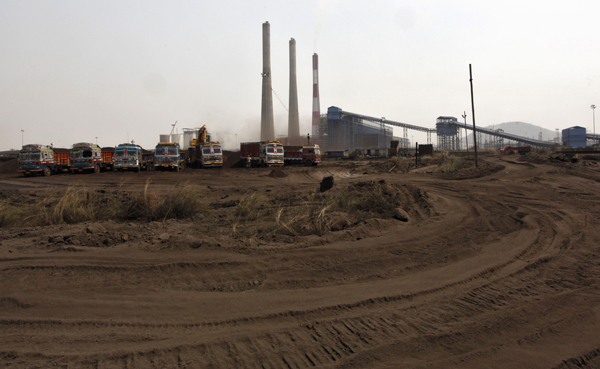 A view of the Jindal Power and Steel Ltd. complex in Orissa. Twelve years after announcing the project, they are still waiting to start digging for coal. (Source: REUTERS/Rupak De Chowdhuri)
A view of the Jindal Power and Steel Ltd. complex in Orissa. Twelve years after announcing the project, they are still waiting to start digging for coal. (Source: REUTERS/Rupak De Chowdhuri)
Former Environment & Forest Minister Jayanthi Natarajan’s resignation drama may be quickly receding from public memory but some of the charges leveled by her in her goodbye letter to Sonia Gandhi are worth revisiting.
Ms. Natarajan claimed in the letter that she was being unfairly accused of delaying large infrastructure projects in 2013 while she was only carrying out instructions sent to her by Rahul Gandhi, Congress Vice-President. The letter was accessed by The Hindu newspaper and created a furore within the Congress party as well as gave the ruling BJP party additional ammunition with which to fling at the previous Government for the economic slowdown in general and stuck projects in specific.
Looking at data from that period, it now appears that the majority of the projects stuck with the Environment Ministry she headed in December 2013 were located in the state of Gujarat, whose Chief Minister was Narendra Modi of rival BJP, the party that came to power in the May 2014 parliamentary and national elections.
Data tabled in the Rajya Sabha shows that as on August 2013, of the 330 project proposals lying with the Ministry of Environment, Gujarat led the list with 52 projects.
Madhya Pradesh, Chattisgarh and Punjab were the other big states with projects awaiting clearances.
MP had 15, Chattisgarh had 14 while Punjab had 28 projects stuck. Orissa not surprisingly is high on the list, with 25 projects stuck. Given that Punjab and Chattisgarh are relatively smaller states, the numbers seem high. Though in the case of Punjab, it would seem that most of the projects were in mining.
Gujarat incidentally was followed by Maharashtra at 44 pending project proposals and then Andhra at 34.
"Among the main reasons for slow growth during the UPA Government’s term, was delays in granting permission to projects. They used to get satisfaction by giving people trouble."
Interestingly, except for Maharashtra and Andhra Pradesh, all other states were ruled by non-UPA parties. Punjab had the Shiromani Akali Dal, MP and Chattisgarh had BJP in power while Orissa had Biju Janata Dal which is non aligned. Maharashtra and Andhra Pradesh were ruled by Congress Chief Ministers.
While there may not be political overtones to the lack of clearances since things were slowing down in general across the board and different states might have had different sizes of project pipelines, it is a coincidence of sorts, particularly in the case of Gujarat which has been trying hard to ramp up its industrial activity.
Finance Minister Arun Jaitley called the episode 'sadistic capitalism’. “Among the main reasons for slow growth during the UPA Government’s term, was delays in granting permission to projects. They used to get satisfaction by giving people trouble,” he told the Times of India.
Mr Jaitley said Ms Natarajan’s letter “conclusively establishes” it was not the statutory or mandatory considerations which weighed with the ruling party in this report.
“But what weighed with them was the whims of political leaders of the party as to who is to be granted environmental permission and who is not to be granted an environmental permission," the Finance Minister said.
In a scenario where whims overtake legal requirements, it becomes a textbook case of "crony capitalism, which the UPA was practising," Mr Jaitley is quoted as saying the same report.
While the BJP mined (pun intended) the episode for its political capital, the allegations made by the former Environment Minister in her letter do place question marks on all projects gathering dust within the offices of the Environment & Forest ministry.
Incidentally, there were four nuclear power projects in Rajasthan, Haryana and Sikkim stuck for environmental clearances too. Note that nuclear power plants by mandate can only be built by the federal Government. Former Prime Minister Manmohan Singh had campaigned hard for the cause of nuclear energy.
This article is also not delving into the relative merit of each project for it is likely that some projects were genuinely environmentally more sensitive. Or may have been, like in the case of the Vedanta projected, rejected by the people of the land where it was meant to come up.
With additional reporting by Abheet Sethi of www.IndiaSpend.com